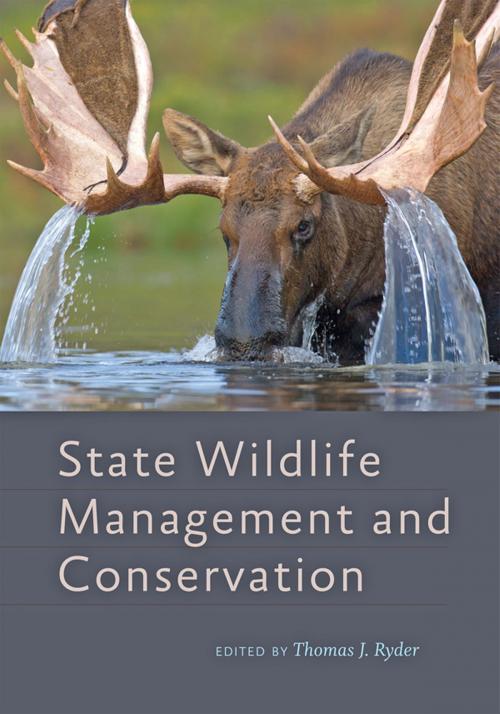State Wildlife Management and Conservation
Nonfiction, Science & Nature, Science, Biological Sciences, Ecology, Biology| Author: | ISBN: | 9781421424477 | |
| Publisher: | Johns Hopkins University Press | Publication: | March 1, 2018 |
| Imprint: | Language: | English |
| Author: | |
| ISBN: | 9781421424477 |
| Publisher: | Johns Hopkins University Press |
| Publication: | March 1, 2018 |
| Imprint: | |
| Language: | English |
The adage "think globally but act locally" defines the work of American wildlife professionals. Their contributions, from remote outposts to major cities, guard the natural world of the entire country. In State Wildlife Management and Conservation, Thomas J. Ryder brings together wildlife leaders from practical, policy, and academic backgrounds to tell the story of state wildlife agencies, chronicling their efforts to restore and protect our nation's natural resources.
Reflecting the core principle of the profession—that the public, not any individual, owns wildlife—the book explains how this tenet became law, laying the groundwork for the history of state-level wildlife management that follows. The authors cover key issues, including the limits of private land ownership, the funding of wildlife regulation, the nuances of humanwildlife conflict, the role of law enforcement, disease control efforts, and the challenges involved in balancing the perspectives of hunters, nonhunters, and animal rights advocates. Detailed essays also discuss state management techniques for a wide range of wildlife, including big game and migratory birds.
State Wildlife Management and Conservation is a comprehensive, nationwide account of state management efforts. It will aid professors training the next generation of wildlife professionals, students hoping to enter the profession, and anyone working with wildlife to develop a more sophisticated understanding of what it means to be a state wildlife biologist.
Contributors: M. Carol Bambery, Gordon R. Batcheller, Chad J. Bishop, Vernon C. Bleich, Dale Caveny, David K. Dahlgren, Daniel J. Decker, Karie L. Decker, Thomas A. Decker, Billy Dukes, John D. Erb, John R. Fischer, Ann B. Forstchen, Jonathan W. Gassett, Parks Gilbert, Colin M. Gillin, Tim L. Hiller, Daniel Hirchert, Michael W. Hubbard, Mark Humpert, Scott Hygnstrom, Robert P. Lanka, Richard E. McCabe, Jennifer Mock-Schaeffer, Brian Nesvik, Shaun L. Oldenburger, John F. Organ, Ronald J. Regan, Michael A. Schroeder, William F. Siemer, Christian Smith, Randy Stark, Gary J. Taylor, J. Scott Taylor, Daniel J. Thompson, Kurt VerCauteren, Mark P. Vrtiska, H. Bryant White, Steven A. Williams
The adage "think globally but act locally" defines the work of American wildlife professionals. Their contributions, from remote outposts to major cities, guard the natural world of the entire country. In State Wildlife Management and Conservation, Thomas J. Ryder brings together wildlife leaders from practical, policy, and academic backgrounds to tell the story of state wildlife agencies, chronicling their efforts to restore and protect our nation's natural resources.
Reflecting the core principle of the profession—that the public, not any individual, owns wildlife—the book explains how this tenet became law, laying the groundwork for the history of state-level wildlife management that follows. The authors cover key issues, including the limits of private land ownership, the funding of wildlife regulation, the nuances of humanwildlife conflict, the role of law enforcement, disease control efforts, and the challenges involved in balancing the perspectives of hunters, nonhunters, and animal rights advocates. Detailed essays also discuss state management techniques for a wide range of wildlife, including big game and migratory birds.
State Wildlife Management and Conservation is a comprehensive, nationwide account of state management efforts. It will aid professors training the next generation of wildlife professionals, students hoping to enter the profession, and anyone working with wildlife to develop a more sophisticated understanding of what it means to be a state wildlife biologist.
Contributors: M. Carol Bambery, Gordon R. Batcheller, Chad J. Bishop, Vernon C. Bleich, Dale Caveny, David K. Dahlgren, Daniel J. Decker, Karie L. Decker, Thomas A. Decker, Billy Dukes, John D. Erb, John R. Fischer, Ann B. Forstchen, Jonathan W. Gassett, Parks Gilbert, Colin M. Gillin, Tim L. Hiller, Daniel Hirchert, Michael W. Hubbard, Mark Humpert, Scott Hygnstrom, Robert P. Lanka, Richard E. McCabe, Jennifer Mock-Schaeffer, Brian Nesvik, Shaun L. Oldenburger, John F. Organ, Ronald J. Regan, Michael A. Schroeder, William F. Siemer, Christian Smith, Randy Stark, Gary J. Taylor, J. Scott Taylor, Daniel J. Thompson, Kurt VerCauteren, Mark P. Vrtiska, H. Bryant White, Steven A. Williams















